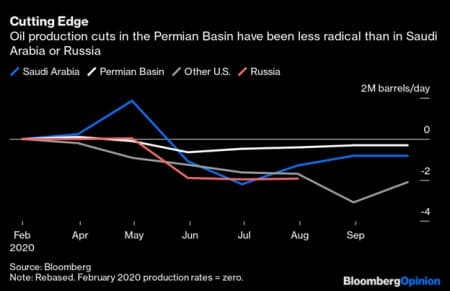The current year marks the 15th anniversary of the U.S. shale boom, a period in which fracking technology across such states as Texas, Colorado, New Mexico, North Dakota, and Wyoming helped establish the nation as a top oil and gas producer.
Unfortunately, high costs of production compared with conventional drilling has led to the sector consistently printing red ink and resulted in considerable destruction of shareholder value. The Covid-19 pandemic and subsequent oil price crash has led to investors souring on the industry further, credit becoming harder to come by, and a cross-section of Wall Street calling the end to the sector.
But the death of the U.S. shale sector might have been greatly exaggerated.
Advertisement
Whereas U.S. shale has recorded a steep production decline due to sharp fall in oil and gas prices, the industry could be primed to recover much faster than what we have been led to believe.
There's no way to sugarcoat it: Since its inception, the U.S. shale industry has been a big money loser.
A June report from Deloitte revealed that during its 15 years of existence, the U.S. shale industry managed to write off a staggering $450 billion in invested capital while generating $300 billion in net negative cash flow. Further, the sector has recorded more than 190 bankruptcies since 2010, the highest by any sector in the United States.
The Covid-19 pandemic only served to make a bad situation much worse. According to Deloitte:
"The oil industry is currently experiencing a 'great compression' in which companies' room to maneuver is restricted by low commodity prices, reduced demand, capital constraints, debt loads, and health impacts of COVID-19. Unlike in previous downturns, these effects are now simultaneous--creating a higher level risk of technical insolvencies and building intense pressure on the industry."
Still, the shale sector is hardly on its deathbed as has been portrayed in some circles.
Advertisement
The U.S. shale patch has an estimated breakeven oil price in the $60-$65 range, well above the current WTI price in the mid-40s. The historically low oil prices have definitely taken a hit on production, with the Texas's Permian Basin pumping 4.49 million barrels a day in September down from 4.9 million barrels in March. Yet, the September figure is actually higher than in any month prior to September 2019. In fact, the decline in Permian production has been less severe compared to the cuts undertaken by the likes of Saudi Arabia and Russia.

Source: Bloomberg
Discuss in our Forums
See what other readers are saying about this article!
Click here to read & post comments.
3 posts so far.